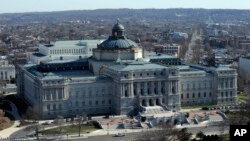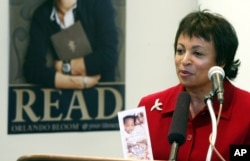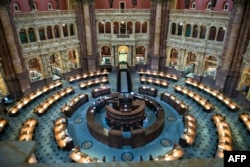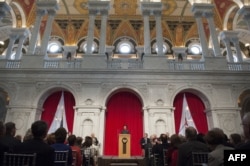Sunday marks the 216th birthday of the U.S. Library of Congress, an institution that not only protects historic books and papers but preserves the best of American writing, song and film.
The collection — the largest in the world, by collection size — is housed in three buildings on Capitol Hill in Washington. The oldest of the three, the Jefferson Building, is just across the street from the U.S. Capitol.
Among its holdings are an original copy of the Declaration of Independence, a Gutenberg Bible, 1 million issues of world newspapers, 3 million sound recordings and at least two famous Stradivarius violins.
The library is the oldest federal cultural institution in the United States. It is in a period of transition, as President Barack Obama's nominee for librarian of Congress awaits the results of her confirmation hearing with the U.S. Senate April 20.
If approved, Carla Hayden, currently the head of the public library of the city of Baltimore, Maryland, would take over the leadership of the Library of Congress, becoming the first African-American, and the first woman, to do so.
Hayden's goals
Hayden has said she would like to make more of the library's resources available online, making it more useful to people in the rural United States who may never get to travel to its headquarters.
She has also said she would like to expand the library's outreach to smaller libraries around the country and continue the public and private partnerships that help the library manage its extensive collections.
Hayden got a warm welcome at her hearing Wednesday, but confirmation is not guaranteed. The Senate is expected to make a decision on Hayden before its summer recess begins in July.
The library has had an interim leader since September, when former Librarian of Congress James Billington stepped down after 38 years on the job. His resignation came just weeks after the library was criticized for widespread computer failures and a watchdog agency's report that the library was wasting millions of taxpayer dollars.
Venerable institution
If confirmed, Hayden will take leadership of an institution whose history goes back to the second president of the United States, John Adams. In 1800, he approved legislation to spend $5,000 of federal money to buy "such books as may be necessary for the use of Congress," essentially as research materials for legislation lawmakers might be considering. The first library catalog was published in 1802 and listed 964 volumes and nine maps.
The collection has suffered several fires. The original 3,000-volume collection was largely destroyed in 1814 when British troops attacked Washington in what is known in the United States as the War of 1812 — a territory and trade dispute between the British and the new American forces who had won a war of independence from Britain in 1783.
Rebuilding collection
After the British left Washington, President Thomas Jefferson helped replenish the library in 1815 by selling his entire personal collection — 6,487 books — to the federal library for $23,950. The books were indeed a boost to the fledgling institution, as Jefferson was a scholar on many subjects: law, language, horticulture, philosophy and various branches of science. He is known to have written in a letter to his predecessor, John Adams: "I cannot live without books."
Unfortunately, a fire in 1851 destroyed much of his original collection. In 1998, library staffers began a 10-year effort to replace those volumes. By 2008, they had managed to replace all but 300 of the original works.
Over the years, the library has become a resource less focused on simply aiding lawmakers with research and more with becoming a cultural repository for American creative works of all kinds, as well as collections of foreign literature. It also serves as the U.S. copyright agency, a research library containing works in 450 languages, and a public institution featuring 22 reading rooms. It sponsors prizes in American fiction and music and is the home of the nation's poet laureate, a post currently held by California writer Juan Felipe Herrera.
Today, while the library's three massive buildings may seem an oasis of peace on busy Capitol Hill, it is not fully insulated from contemporary politics. In the past week, a committee in the U.S. House of Representatives approved a bill blocking the library from changing its subject headings and search terms from "illegal aliens" — a term critics complain is negative and unclear — to "noncitizens." The library's stance on this issue is just one of the many issues the next librarian of Congress will have to confront.



